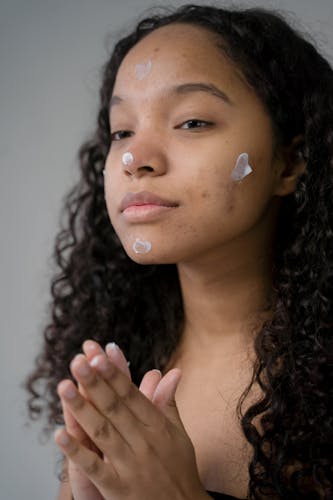Can Whitening Creams Really Work Overnight? Myth Busted

Can Whitening Creams Really Work Overnight? Myth Busted
Ever bought a good whitening cream hoping to wake up with flawless, brighter skin? The whitening creams work overnight myth promises that skin whitening creams can lighten dark spots or even out your complexion in just one night. But is this beauty dream backed by science, or is it just clever marketing? Join us at omnimyths.com to uncover the truth and learn how to achieve radiant skin safely!
The Roots of the Overnight Whitening Myth
How did the whitening creams work overnight myth take hold? It’s a mix of marketing hype and societal pressures.
In the early 2000s, beauty brands in Asia and beyond began promoting skin whitening creams as miracle fixes, especially in countries like South Korea and India, where lighter skin was tied to beauty ideals rooted in historical class distinctions (Journal of Social Issues, 2021). Ads for Korean whitening cream and Japanese whitening face cream flooded TV and magazines, claiming instant brightness with slick before-and-after photos. These promises spread globally, from Lagos to Los Angeles, fueled by the rise of e-commerce and social media. The idea that a single application could transform skin was born from exaggerated claims, not science (The Conversation, 2024).
Why did it catch on? Consumers like Maria, a cashier in Manila, saw X posts raving about whitening face cream delivering “overnight glow.” The allure of quick results in a bottle kept the myth alive, despite biology saying otherwise (American Academy of Dermatology, 2023).
Why We Buy Into the Overnight Promise
The whitening creams work overnight myth is hard to resist because it taps into our desire for instant fixes. Who doesn’t want to look their best by morning?
Imagine Sarah, a student in Chicago, scrolling TikTok and seeing an influencer flaunt radiant skin after one use of a good whitening cream. She’s sold on the dream, just like millions in Seoul or Nairobi chasing the same promise. The myth thrives on emotional marketing—ads for Korean whitening cream use glowing models and phrases like “instant radiance” to hook us (Forbes, 2025). Our brains crave quick wins, especially in a world obsessed with perfection.
Social media amplifies this. X posts and Instagram reels showcase dramatic transformations, often edited or staged, making skin whitening creams seem like magic. Cultural pressures, from Asia’s beauty standards to Africa’s colorism legacy, add fuel, pushing the idea that lighter skin equals success (World Health Organization, 2023).
Debunking the Overnight Whitening Myth
Let’s use science to bust the whitening creams work overnight myth and reveal what skin whitening creams can actually do.
Skin Lightening Takes Time
Skin whitening creams work by reducing melanin, the pigment responsible for skin color, using ingredients like niacinamide, vitamin C, or kojic acid. This process requires weeks, as skin cells turn over every 28–40 days, with visible results often taking 6–8 weeks (Journal of Cosmetic Dermatology, 2023). Overnight effects, like a “glow” from whitening face cream, are usually due to hydration or light-reflecting ingredients, not true whitening. Claims of instant results are marketing tricks, not biology.
Dangerous Ingredients Lurk
Some creams, especially unregulated ones, use harmful substances like hydroquinone or mercury to promise fast results. These can cause irritation, scarring, or even ochronosis (a permanent bluish discoloration), especially with prolonged use (FDA, 2024). The idea of a permanent skin whitening cream without side effects is a fantasy—safe whitening requires slow, steady application. Always avoid sketchy products sold online or without clear ingredient lists.

Sunscreen Is Non-Negotiable
Sun exposure darkens skin by boosting melanin, undoing any good whitening cream effects. Studies show using whitening sunscreen cream with SPF 30+ is critical to protect results, yet many skip it, expecting overnight miracles (American Academy of Dermatology, 2023). Without sun protection, even the best Korean whitening cream falls short. The myth ignores this key step.
Results Vary Widely
Skin type, genetics, and lifestyle affect how skin whitening creams work. A 2024 study found that darker skin tones or sun-damaged skin may need longer for results, while sensitive skin risks irritation from aggressive products (Dermatology and Therapy, 2024). The whitening creams work overnight myth falsely promises universal, instant success.
The Real Cost of Chasing Overnight Results
Picture Ahmed, a barista in Dubai, using a cheap whitening face cream he found online, hoping for quick brightness. After a week of no results, he overapplies, causing redness and peeling. This cycle—hype, disappointment, and harm—is common worldwide, from Brazil to Bangkok, where skin whitening creams are a $20 billion industry (Forbes, 2025). Money and skin health are wasted on false promises.
The myth also fuels deeper issues. Colorism, embedded in ads for Japanese whitening face cream or body skin whitening cream, can erode self-esteem, especially for people of color pressured to lighten their skin (The Conversation, 2021). Chasing overnight fixes distracts from true confidence and healthy skincare.
How to Use Whitening Creams the Right Way
Pick Safe Products
- Read labels: Choose good whitening cream with niacinamide, vitamin C, or arbutin; skip mercury or high-dose hydroquinone.
- Go reputable: Brands like CeraVe or Paula’s Choice offer tested whitening face cream options.
- Patch test: Apply a dab on your wrist to avoid reactions.
Build a Smart Routine
- Apply nightly: Use skin whitening creams consistently for 6–8 weeks.
- Pair with SPF: Whitening sunscreen cream (SPF 30+) is a must to protect progress.
- See a dermatologist: Get tailored advice for your skin type (Mayo Clinic, 2024).
Prioritize Skin Health
- Moisturize: Hydrated skin supports good whitening cream results.
- Exfoliate gently: Weekly exfoliation boosts cell turnover safely.
- Eat well: A diet rich in antioxidants aids skin clarity (National Institutes of Health, 2023).
Real-Life Skincare Success Stories
Take Priya, a teacher in Mumbai, who ditched overnight Korean whitening cream promises for a niacinamide-based routine. After 8 weeks with whitening sunscreen cream, her dark spots faded, and she felt confident. Or consider James, a chef in London, who used a whitening face cream under dermatologist guidance, seeing gradual results without irritation. These stories show patience beats the whitening creams work overnight myth (Healthline, 2025).
Conclusion
The whitening creams work overnight myth lures us with promises of instant radiance, but science says skin whitening creams need weeks for safe, real results. Don’t fall for marketing hype—choose tested products, use whitening sunscreen cream, and be patient. Glow up the right way! Explore more beauty myths at omnimyths.com!
Frequently Asked Questions
Q: Can whitening creams work overnight?
A: No, the whitening creams work overnight myth is false—skin whitening creams need 6–8 weeks to reduce melanin and fade dark spots. Overnight “brightness” is often just hydration or reflective ingredients. Consistent use with whitening sunscreen cream is key for results. Safe products avoid harm and deliver gradual change (Journal of Cosmetic Dermatology, 2023).
Q: Are skin whitening creams safe to use?
A: Safe skin whitening creams, like those with niacinamide or vitamin C, are generally fine but require consistent use and sun protection. Unregulated creams with mercury or hydroquinone can cause irritation or permanent damage like ochronosis. Always choose reputable brands like Korean whitening cream from trusted sources. Consult a dermatologist for safety (FDA, 2024).
Q: How long do whitening creams take to show results?
A: Good whitening cream products, such as whitening face cream, take 6–8 weeks to lighten skin, depending on skin type and product strength. Melanin reduction requires cell turnover, which takes time. Using whitening sunscreen cream prevents darkening. Patience is essential for real results (Dermatology and Therapy, 2024).
Q: Why do ads claim whitening creams work overnight?
A: Marketing for Japanese whitening face cream or Korean whitening cream exaggerates with “instant glow” claims to sell products. Before-and-after photos are often edited or show temporary hydration effects. The whitening creams work overnight myth exploits our desire for quick fixes. Science debunks these promises (Forbes, 2025).
Q: Can everyone use whitening creams effectively?
A: Results from skin whitening creams vary by skin type, genetics, and sun exposure. Sensitive or darker skin may need longer or gentler products to avoid irritation. Always use whitening sunscreen cream to maintain progress. A dermatologist can tailor a plan for you (American Academy of Dermatology, 2023).
Q: What’s the best way to choose a whitening cream?
A: Pick a good whitening cream with safe ingredients like niacinamide or kojic acid, avoiding harmful chemicals like mercury. Look for trusted brands in Korean whitening cream or Japanese whitening face cream lines. Check reviews and test on a small area first. Pair with SPF for lasting results (Mayo Clinic, 2024).
